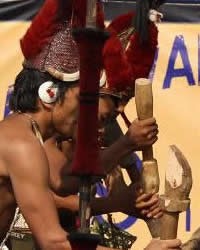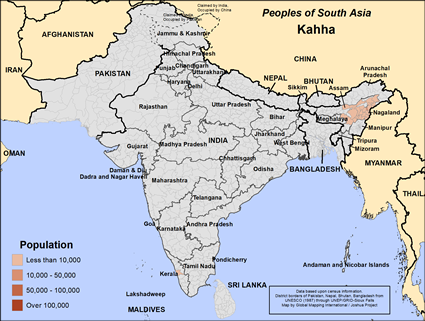Kahha in India

Photo Source:
Anonymous
|

Map Source:
People Group data: Omid. Map geography: UNESCO / GMI. Map Design: Joshua Project.
|
| People Name: | Kahha |
| Country: | India |
| 10/40 Window: | Yes |
| Population: | 54,000 |
| World Population: | 54,000 |
| Primary Language: | Naga, Phom |
| Primary Religion: | Christianity |
| Christian Adherents: | 99.20 % |
| Evangelicals: | 0.00 % |
| Scripture: | Complete Bible |
| Ministry Resources: | Yes |
| Jesus Film: | Yes |
| Audio Recordings: | Yes |
| People Cluster: | South Asia Tribal - Naga |
| Affinity Bloc: | South Asian Peoples |
| Progress Level: |
|
Introduction / History
The Kahha people are also known as the Phom Naga. They are an indigenous group primarily residing in the northeastern state of Nagaland, with smaller populations in Assam, Arunachal Pradesh, Tamil Nadu, and Kerala. They speak Phom, one of the Naga languages.
What Are Their Lives Like?
Kahhas enjoy their own traditional dances, music, and festivals. Their favorite sports include archery and wrestling. Weaving and woodcarving are not only recreational activities, but also ways of producing goods for the market.
They are subsistence farmers who eat what they grow and raise. Rice is their staple crop, but they also each vegetables, fermented bamboo shoots, and wild greens. They get their meat from their livestock. Men catch fish in nearby rivers.
What Are Their Beliefs?
Though they are Christian, some also worship their ancestors and perform rituals to honor nature spirits. Their festivals combine Christian and animistic elements.
What Are Their Needs?
Kahhas need more educational opportunities so they can get beyond subsistence farming. Healthcare is limited in rural India, resulting in inadequate emergency care.
Prayer Points
Pray for hundreds to be raised up with a defiant faith in Christ, one that will not be shaken no matter what comes their way.
Pray for God to bring about his purpose for the Kahhas.
Pray for Christians to have love, joy, peace, and patience as they tell others about the King of kings.
Pray for a powerful Holy Spirit revival to permeate their families and churches, drawing them into greater love for God and for their neighbors.